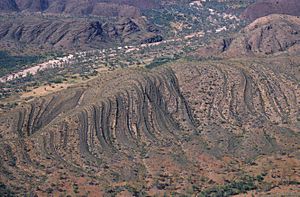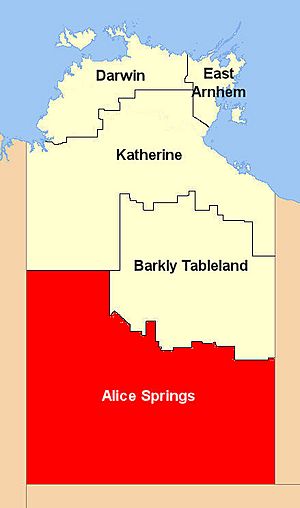Central Australia facts for kids
Quick facts for kids Central AustraliaNorthern Territory |
|
|---|---|

Aerial view of Central Australian landscape
|
|
| Population | 41,000 (2016) |
| LGA(s) |
|
Central Australia, also known as the Red Centre, is a special area in the middle of Australia. It's famous for its red deserts and unique landscapes. Most people think of it as the area around the town of Alice Springs and the nearby MacDonnell Ranges. Sometimes, it can mean a much larger area, stretching up to 600 kilometers from Alice Springs in every direction. When people talk about the "Outback", they often mean places like Central Australia.
Locals sometimes call this region Centralia.
Contents
How is Central Australia Defined?
Central Australia can be described in a few ways.
Government Regions
The government of the Northern Territory divides the area into different regions for planning. Central Australia is one of these regions.
There are six main regions in the Northern Territory:
- Central Australia
- Darwin, Palmerston & Litchfield
- East Arnhem
- Barkly Region
- Big Rivers Region
- Top End
About 41,000 people live in the Central Australia region. Most of these people (around 28,000) live in Alice Springs. Alice Springs also provides services to parts of South Australia, Western Australia, and Queensland.
The region includes these local government areas:
- Town of Alice Springs (a town council)
- Central Desert Region (a larger regional council)
- MacDonnell Region (another large regional council)
- Yulara (a small town that is not part of a council)
General Use
When people talk about the plants and animals of Australia, "Central Australia" can mean a very large area. This includes the Lake Eyre Basin, which spreads across three states and the Northern Territory. For many, the term "outback" means almost the same thing as Central Australia.
Climate in Central Australia
Central Australia has a desert climate, which means it's very dry. On average, it gets only about 150 millimeters (6 inches) of rain each year. Most of this rain falls during big storms in the summer months.
The weather is usually dry and mild from May to October (winter). From November to April (summer), it gets very hot.
See also
 In Spanish: Australia Central para niños
In Spanish: Australia Central para niños


